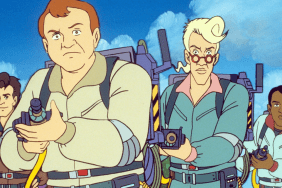Who doesn’t love attending events held in their honor? It all starts with baby namings, Brisses or Christenings and then it’s onto birthday parties, graduations and weddings, so why isn’t it the same for funerals? Of course the tradition is to hold the funeral after the individual has passed, but what happens if that person wants to come full circle and be part of their exit ceremony just as they were when they entered this world and during all the milestones they hit as they trudged through it?
Well, that’s exactly what Felix Bush (Robert Duvall) of Get Low is thinking, but sadly it’s not in a very celebratory manner. Bush is the town hermit, his rickety old cabin in the woods a prime target for stone-throwing kids looking for a quick thrill. There are heaps of rumors floating around about Bush that he’s committed every offense possible from killing another man to dealing with the devil. Bush may have a dark past, but that picture isn’t nearly as gloomy as the town has painted it.
However, during a recent roundtable interview, Duvall’s co-star Sissy Spacek explained, “I think he wanted to punish himself and to listen to people tell horrible stories about him so he could cleanse his soul before he really died.”
And that’s where his venture to plan his own funeral comes about. Bush drives into town one day to pay Frank Quinn (Bill Murray), the local funeral home owner, a visit. Frank is well aware of Bush’s reputation, but the guarantee of a hefty payment wins him over and he puts his trainee Buddy Robinson (Lucas Black) in charge of Bush’s self-planned funeral. “He could have been a lawyer, he could have been a doctor, he could have been a schoolteacher, he could have been a world traveler, merchant marine,” Duvall said of his character. “He’s not a dumb guy; he could have been a lot of things, but he chose to live in the woods out of this deep sense of guilt or being ashamed of what he did or what he thinks he might have done.”
Even without divulging the secret of the exact atrocity Bush committed, it’s easy to see there’s something about the character that created an intense attraction to Get Low for Duvall. Having a hard time seeing it for yourself? Duvall was so committed to the project, he held on for about five years during its lengthy pre-production process. “I’d given up on it,” Duvall recalled, “They came to my farm once and then they came again. The initial script was good, then they rewrote, it wasn’t so good and then they got a guy, Charlie Mitchell from Alabama, who put the final touches. But even when that happened, they didn’t have the money. A year ago [in] December they said, ‘Now’s the time.’ I said, ‘I’m not ready. I can’t.’ ‘Oh, we’ve got to.’ I thought to myself, ‘I better do it now.'”
Spacek shared her similar experience. “They’d call about every four years and I’d go, ‘Who? It’s who? Oh, right!'”
Director Aaron Schneider admitted, “Sissy was our first choice, so we set up a meeting and I went over and spent four hours actually talking about the project in an office over at her agency and got to know her and got all excited and then it was another four years before we called her and hired her.” He added, “She likes to joke, by the time we called her she said she was finally old enough to play the part.”
However, Murray was a different case and even with powerful performers like Duvall and Spacek already on board, Murray become the linchpin of the whole thing. Producer Dean Zanuck explained, “He was on the list, but with someone like Bill and sort of his well known elusivity, you don’t even know where to start. One day, on a lark, I called his attorney, his only representation, and I asked him just point blank, ‘How does one get into the Bill Murray business?’ And he says, ‘Well, they don’t.'”

After Murray’s attorney painted that honestly grim outlook, Zanuck still decided to send the film’s synopsis his way. “Maybe two, three weeks after that I was driving home from our lead investor’s house who wasn’t in at the time, we were courting him, and my assistant said, ‘We have an interesting message on our answering machine.’ It was Bill Murray and he said, ‘Hi, it’s Bill Murray. I’m interested in “Get Low” if it’s still available. Send a screenplay to this P.O. box.’ Didn’t leave a number, nothing.” From there the necessary course of action was obvious. “We immediately FedEx-ed the screenplay and I called the lawyer.” Again, Murray’ attorney said they’ve made progress, but the odds are still against them, but Zanuck admitted, “at this point we were now incorporating Bill into our financial pitch, which had kind of a double-edged sword; we were banking on landing him, but here’s a guy that you don’t know if you have him until he shows up on the set.”
After a grueling two-week wait, Murray finally called and asked for Schneider’s number. Schneider approached the situation exactly how most would, he slept with his phone by his bed for weeks in the case that Murray called. When he didn’t, the only thing Schneider could think to do was to write Murray a letter. “I sat down and I wrote a letter, took me like two or three days to write it because it’s like, how do you write a letter to Bill Murray? Dear Bill, then what?” he joked. “I finally just decided to tell him, kind of put my heart on the page and said here’s why we want you and here’s what I think this could be.” Apparently that was the right course of action because a few weeks later, Schneider got the good news, Murray was in.
But casting wasn’t the only thing that threw Schneider and Zanuck for a loop. Financing Get Low was no easy task and therefore it had to be approached in an extreme manner. “We searched far and wide to come up with, it was only $7.5 million and we were in Germany, we were in Poland, we’d go wherever there was a lead and ended up with [what] we call them ‘the continentals,’ just a real consortium of private equity from Malibu to Georgia to Warsaw,” explained Zanuck. While this effort may sound unusual, Zanuck looked at it as the typical way most handle an independent project. “You’re independent of any studio, you’re independent of a distributor, you’re on a wing and prayer and I think we certainly aren’t the first people to go out and huddle money together and cross your fingers. We just thought we had a really good bet, that’s all.”
The duo’s lead investor must have felt the same way, because eventually, that person forked up a whopping $5.5 million, but convincing him to commit that cash wasn’t an easy task. “So the lead investor says to me, prospective lead investor at the time, he says, ‘I want to see two signed contracts, one from Robert Duvall and one from Bill Murray and my word is good, you’ll have $5.5 million,'” recalled Zanuck. “We got Robert’s signed and I called [Bill’s] attorney and I tell him what we need and he says, ‘Bill has a superstition, he doesn’t sign.'” Even with Murray’s inconvenient tradition, a meeting arranged between the investor and Murray’s attorney sealed the deal. Zanuck added, “Bill eventually did sign, but it was about three months after we wrapped.”
Finally pre-production did come to an end and the cast hit the Georgia set. Thanks to Schneider’s experience shooting his short film “Two Soldiers” based on William Faulkner’s original work, he had experience hunting down a location prime for a 1930s setting. “You have to find places lost in time,” he explained. “You have to bring the movie to the location and that’s why we went to the south.There are places where the economy kind of helped the filmmakers. It didn’t much help the community, but where we shot, it was a very economically depressed town and when you’re in a place like that, there’s no money for infrastructure, right? And so places don’t change as quickly.”

Duvall’s favorite place about that location? A Chinese restaurant. “There was a great Chinese restaurant down there in the middle of nowhere. It was terrific,” he recalled happily. A place to unwind was a necessity for Duvall because “sometimes when I carry [my character] with me, I get pissed off or if things weren’t going right or I didn’t think it was just right, you carry that with you, the frustration sometimes.”
The biggest bummer for Spacek? “I loved investigating the 1930s, but women wore so many undergarments then, it was really hard,” she recalled.
Murray joked, “That was a bummer for me too, baby.”
Actually, Murray’s costumes were the most dapper of the bunch, however, he had his eyes on Duvall’s outfits. He explained, “We had a great costumer on this movie, one of the best I’ve ever worked with named Julie Weiss. Bob’s clothes are unbelievable, and I just kept saying, ‘Are you stealing that? Are you taking that home?'”
Then Murray turned added to Spacek, “And you had amazing hair too,” to which she replied, “Every time I would come out of makeup after four hours of sitting under a hairdryer, he would say ‘Hey Grandma!'”
“Well, she had my grandmother’s hairdo,” Murray said with a giggle.
Spacek’s character isn’t exactly the grandma-type. She’s actually somewhat of a love interest in the film. Her character, Maddie Darrow, is the only person living in town who truly knows Bush. As the story unfolds, her relationship becomes complicated just like Spacek’s first personal experience with true love. “His name was Cliff Cane, Clifford Zack Cane; he was just the cutest boy. We were boyfriend and girlfriend from like five years old on,” she told us. “Cliff presented me with this beautiful sterling silver signet ring with his initials on it; I was just thrilled to death. Well, several weeks pass and a new girl moves to town and she’s got breasts. I can’t remember her name, but he quickly broke up with me, wanted his ring back, and next thing I knew this girl had the ring on her finger.” Don’t worry; Spacek got some reprisal. “There’s a moral to this story, never give a ring that you’ve measured for one girl to another girl because it got stuck on her finger and so her dad cut if off with metal clippers and gave it back to him in two pieces when she broke up with him.”
While Spacek and Murray enjoyed bantering with one another, Duvall’s interview took a turn towards serious business, Oscar talk. When someone suggested this performance can create similar buzz as Jeff Bridges in Crazy Heart, Duvall humbly explained, “People have said that. They spent a lot of money on ‘Crazy Heart’ and it’s different.”
Academy Award nomination or not, there is someone out there who thinks his portrayal of Felix Bush is one of his best performances yet, his wife. “This is my wife’s favorite film I’ve done in maybe 15, sheesh; she loves this film, the script.” Duvall didn’t dismiss the idea of a nomination completely, but he did point out, “Academy Awards, they can be very political. When I did ‘The Great Santini,’ I was sitting in my chair just meeting the producers and they said, ‘Well, they’re talking about Academy ’ before we even rehearsed it or anything! So there’s a strange preoccupation in this country, especially Hollywood about that. If those things happen it’s a secondary thing; you try to do a good job.”
Interested in judging whether Duvall’s performance is Oscar worthy for yourself? Check out Get Low when it opens in New York and L.A. on July 30, 2010.









